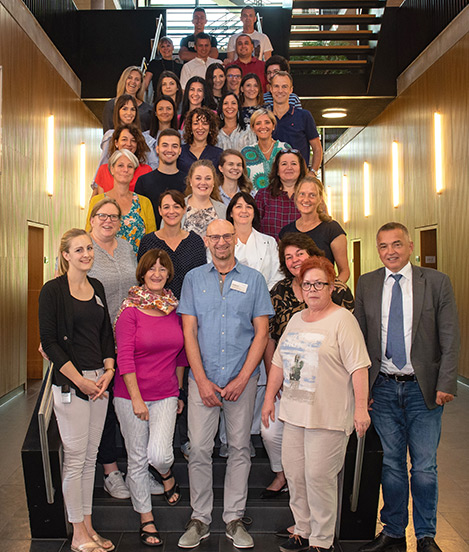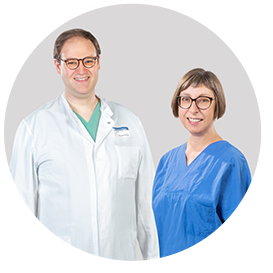A greeting, another padded leather door – and then the trained male nurse Arsic is almost where he wants to be: a huge map on the wall shows a view of “Germany, a political map”, a little red flag pinpoints “Heidelberg”. Heidelberg University employees, who have traveled here in order to conduct interviews with Ivan and 52 other nurses in Belgrade and Sarajevo, are sitting around the table. “We would like to personally get to know the applicants, so that we can be sure that they will feel comfortable with us”, says Tobias Aurig, who is responsible for Integration management at the University Hospital; moreover, he is the Deputy Head of Nursing at the Center for Pediatric and Adolescent Medicine as well as at the Women’s Hospital and the Dermatology Department.
Nursing care links people and countries



Impulses for nursing
Nursing care links people and countries
In the search for qualified employees for our Nursing Service, UKHD is striking out in a new direction and even dares to go abroad: All in all, about 200 trained nurses from Serbia and Bosnia-Hercegovina support patient-care activities at the University Hospital. We were there during the job interviews in Belgrade and Sarajevo!
Twenty-three-year old Ivan Arsic (the name has been changed) enters a plain house in the center of the city of Belgrade, rides up to the fourth floor, makes a sharp right-hand turn in front of the spice dealer and finds himself in a small office maintained by the Gesellschaft für Internationale Zusammenarbeit (GIZ) in Belgrade.
He is accompanied by Rayk Oemus, who is now the Head of Nursing at the Bergstrasse County Hospital as well as Marijana Krcic-Mastilovic and her sister-in-law Snjezana Krcic-Jankovic, who have been working as nurse and healthcare professionals at UKHD for many years. Both native Bosnians ensure that the West Balkans and Heidelberg will get off to a good start with each other. They translate during visits to government agencies, support the “newcomers” in their search for an apartment, and during visits to the doctor, and organize trips home to see the family.

The Heidelberg Triple-Win Team during the interviews in in Belgrade.
Heidelberg University Hospital: A strong employer
So that outstanding patient care remains our standard, we offer our employees the prerequisites for professional work on the highest level:
- Targeted and systematic familiarization
- Ultra-modern departments with innovative equipment and features
- Interdisciplinary teamwork
- Independence, active participation, and responsibility
- Link between research and practice
- Further training and additional qualifications.
As a training facility, UKHD is also committed to the future of young nurses and their vocational fields: Training courses in twelve occupations are offered at the Akademie für Gesundheitsberufe Heidelberg at Heidelberg University Hospital and at the Evangelische Stadtmission Heidelberg – for example, for registered nurses, Medico-Technical Lab Assistants (MTLA), and Anesthesia Technical Assistants (ATA).
Getting back to Ivan Arsic: The Heidelberg “Triple-Win” representatives take their time for their decision. Does the applicant fit into the team? Is he motivated enough to meet the requirements of cutting-edge medicine at Heidelberg? For which department could he be suitable? Arsic convinces them with his open, straightforward manner. He gave up the study of law, the wish of his parents, after two semesters, because he preferred to become a nurse. “I like helping sick people. This is human work”, he says in somewhat broken German, but everyone understands what he means. He gets the job and is no longer unemployed. Does he have any questions? He says with a radiant smile, “I have no questions, only joy”!
This is the triple win
“Triple Win” is a collaboration between GIZ and the International and Specialized Services Office (ZAV) of the German Federal Employment Agency for the lasting recruitment of nurses from abroad. Since 2013, this project has recruited workers to Germany from countries in which there is a surplus of well-trained nurses. The name of this project stands for the idea that all three parties benefit – employers, because they can find urgently needed skilled workers; employees, because they receive a job in a safe and regulated process; and their countries of origin, because their domestic labor market is relieved of excess workers.
Persons admitted to the program receive a preparation course and German lessons and also acquire the required work visa much more quickly than other migrants seeking work. In Germany, the new colleagues from abroad are initially given a limited-term contract for one year as a nurse’s aide. If they pass a knowledge test and a German B2-level examination within their trial year, they will be hired for an unlimited term as nurses and healthcare professionals, and will be paid in accordance with collective wage agreements, like their German colleagues.

Going where the applicants are: With an information booth in large shopping centers in Belgrade and Sarajevo, the team from Heidelberg draws attention to the excellent working conditions and development possibilities at Heidelberg University Hospital.

Director of Nursing Edgar Reisch (right) and university hospital employees greet their new colleagues.
In May of 2019, the time has finally come: Our new colleagues arrive from Serbia and Hercegovina with the overnight bus. “We will all look after you so that you will feel comfortable here and have a good place to work”, says Head of Nursing and Management Board Member Edgar Reisch in his words of welcome to the newly arrived staff. So that nothing goes wrong in the first few months in Germany, the Heidelberg “Triple Win” team will arrange for housing, accompany the “newcomers” on visits to government agencies, and help them to open a bank account and obtain the necessary insurance. Just as helpful is the eager willingness on the part of the permanent employees to incorporate the “newcomers” into their team. “This project is so successful, because everyone pulls together", says Reisch. “We are happy and grateful for how open and friendly the colleagues are when integrating the new staff members into the wards.”

Impulses from strong teams
Dr. Jan Beckendorf
Cardiologist
Elke Felleisen
Heart Nurse
Nurses and physicians work closely together. But when a diseased, weak heart is barely able to perform, their teamwork is more important than ever. Elke Felleisen and Jan Beckendorf jointly look after seriously ill heart patients. They interact as equals, and fight side by side for patients whose only hope for a normal life is an organ transplant. They pass on their extensive knowledge to young nurses in the Heidelberg Heart Nurse Course.


